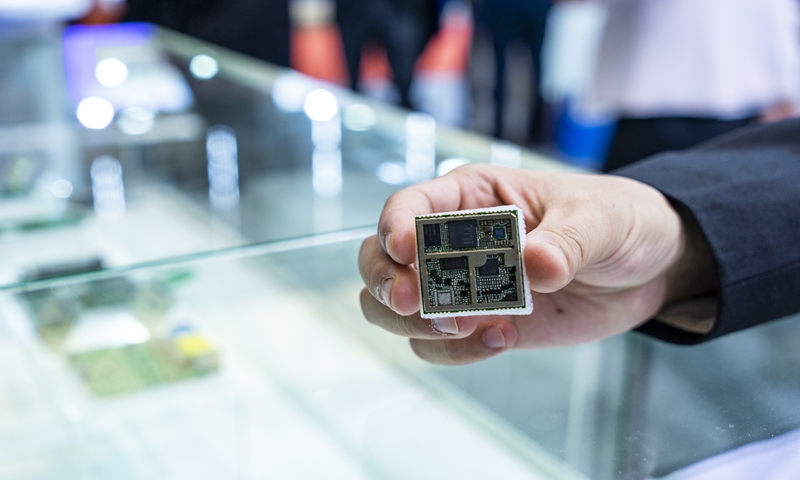Chip pinch set to persist until Q4 as consumer demand rises, companies stockpile: insiders

An employee showcases a semiconductor integrated circuit at an industry expo. Photo: VCG
From large industrial products like vehicles to consumer goods like tiny blue-tooth earphones, semiconductor shortages have become the new normal since the second half of last year, and the situation won't improve until the fourth quarter of 2021, industry insiders in China told the Global Times on Wednesday.
US-based automaker Ford has reportedly ordered a month-long production halt at one of its plants in Germany - which employs around 5,000 workers -- the latest sign that a global chip shortage is wreaking havoc on automakers and the automotive industry.
Last week, Ford was forced to close a facility in the US state of Kentucky due to a shortage of semiconductors.
Separately, German automaker Volkswagen said that it lost tens of thousands of cars in production in China, a critical market, due to the global chip supply shortage. "It was hurting us already in December and we lost some 10,000 cars since then simply because we lost 50,000 cars in production in December because of some chips," VW's China head, Stephan Wollenstein, said during an online media briefing on Wednesday. Investment bank UBS forecast that the chip shortage is likely to deal a blow to all major auto manufacturers in the first quarter of 2021.
In China, the world's major producer and consumer of electronic goods, terminal makers reliant on chip supply feel that their hands are tied on the issue. They are working around the clock to source more chips. Meanwhile, their upstream chipmakers are sourcing more silicon wafers - thin discs of silicon material where patterns that make chips for electronic devices are printed.
A representative of Jiangxin Microelectronics Technology Co told the Global Times on Wednesday that chip supplies had tightened since the second half of last year, when the COVID-19 epidemic was brought well under control in China.
"The demand for electronic goods grew robustly to such an extent that it beat our expectations, but foundries' wafer output could not catch up with demand," said the representative.
The microcamera maker, based in Dongguan, South China's Guangdong Province, has to pay more for chips. It supplies products for smartphones and tablets of leading brands like Samsung and Huawei.
Foundries are inclined to supply big clients first because of the higher profits involved, so there's not much left over for smaller clients, Han Xiaomin, general manager of JiWei Insights, a semiconductor consulting firm, told the Global Times on Wednesday.
Chip demand is rising for more than one reason. First, there's pent-up demand for consumer electronic goods, driven by the work-from-home economy. Second, there's an industry wave of increasing chip inventories, according to Han.
"The technology war between China and the US, with the latter putting more Chinese technology companies on its blacklist, has served as a wake-up call. More domestic players are following the example of Huawei to add more chips to their inventories in case of any unexpected changes," he said.
"Normally, manufacturers prepare their inventories two quarters in advance, but now they are hoarding more - more than one year's quantity," he added.
Huixinchen Technology Co, a high-tech company engaged in the research and development of liquid crystal on silicon chip design, is also battling for wafers.
"We are finding a way out. Now our inventory has far exceeded our demand, by fivefold," Li, a company representative said.
Han said the chip shortage won't ease in the first half of 2021, and it will probably last all year.
"The stocking-up frenzy won't last long," Han said. "Within half a year of US President Joe Biden's inauguration, his attitude and policy on Chinese high tech will become clear. By then, no matter whether the US continues adding pressure or shows some signs of easing, the market will stabilize."
An investment manager specializing in the telecoms, media and technology sector surnamed Jia said the chip shortage might last until the fourth quarter.
"With coronavirus immunizations rising ... an expansion in wafer capacity would take place, and the abnormal situation of global semiconductor supplies could be mitigated," Jia told the Global Times on Wednesday.
Several semiconductor companies have announced plans to expand production. For example, Taiwan Semiconductor Manufacturing Co -- the world's largest contract chipmaker, which supplies Apple -- said last week that it will raise capital expenditures to $25-$28 billion in 2021 to develop advanced chips and add capacity.
